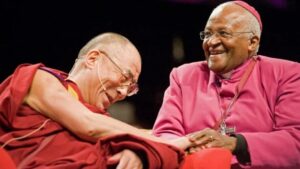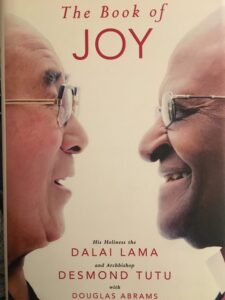
Photo: OHHDL
Archbishop Desmond Tutu, the world-renowned cleric and social activist, figurehead of the struggle against apartheid in South Africa, died on December 26 at the age of 90. Tributes from religious, humanitarian and world leaders from around the globe have poured in.
Desmond Tutu was a longtime friend of his fellow Nobel Laureate, His Holiness the Dalai Lama who, on hearing of his friend’s death, wrote to Archbishop Tutu’s daughter, Rev Mpho Tut:
“Please accept my heartfelt condolences, and convey the same to your mother and other members of your family. I pray for him.
“As you know, over the years, your father and I enjoyed an enduring friendship. I remember the many occasions we spent time together, including the week here at Dharamsala in 2015 when we were able to share our thoughts on how to increase peace and joy in the world. The friendship and the spiritual bond between us was something we cherished.
“Archbishop Desmond Tutu was entirely dedicated to serving his brothers and sisters for the greater common good. He was a true humanitarian and a committed advocate of human rights. His work for the Truth and Reconciliation Commission was an inspiration for others around the world.
“With his passing away, we have lost a great man, who lived a truly meaningful life. He was devoted to the service of others, especially those who are least fortunate. I am convinced the best tribute we can pay him and keep his spirit alive is to do as he did and constantly look to see how we too can be of help to others.”
 His Holiness the Dalai Lama and Archbishop Tutu wrote a book together in 2015, The Book of Joy. The website Goodreads describes the book, “Both winners of the Nobel Prize, both great spiritual masters and moral leaders of our time, they are also known for being among the most infectiously happy people on the planet […] Both the Dalai Lama and Archbishop Tutu have been tested by great personal and national adversity, and here they share their personal stories of struggle and renewal. […]Most of all[…] they demonstrated by their own exuberance, compassion, and humour how joy can be transformed from a fleeting emotion into an enduring way of life”.
His Holiness the Dalai Lama and Archbishop Tutu wrote a book together in 2015, The Book of Joy. The website Goodreads describes the book, “Both winners of the Nobel Prize, both great spiritual masters and moral leaders of our time, they are also known for being among the most infectiously happy people on the planet […] Both the Dalai Lama and Archbishop Tutu have been tested by great personal and national adversity, and here they share their personal stories of struggle and renewal. […]Most of all[…] they demonstrated by their own exuberance, compassion, and humour how joy can be transformed from a fleeting emotion into an enduring way of life”.
In a documentary about the book, Desmond Tutu said of His Holiness, “But I always say to people, after being in exile over 50 years how many would show the same serenity, the same joy, and the eagerness to spread goodness and compassion in the world […] He is there for us as a beacon to tell us that you can, in fact, overcome some of the most horrendous circumstances, and emerge on the other side, not broken. So he is a very great gift to the world”. His Holiness said of Desmond Tutu, “I think, at time of my deathI will remember you.” The two were captured on video together, Desmond Tutu teaching His Holiness how to dance.
Archishop Desmond Tutu was born in 1931 in Klerksdorp, Transvaal. He started his career as a teacher before studying theology and becoming ordained in 1960. In 1975 he became the first black person to be appointed Dean of St Mary’s Cathedral in Johannesburg, the following year he was appointed Bishop of Lesotho and in 1978, the first black General Secretary of the South African Council of Churches, which functions as a national committee for the World Council of Churches. He held an honorary doctorate from a number of leading universities in the USA, Britain and Germany. Desmond Tutu was awarded the Nobel Peace Prize in 1984.
The Tibetan Government-in-exile held a prayer service for the Archbishop; Sikyong Penpa Tsering, President of the exile government said, “The Tibetan people were among the millions who were the fortunate recipient of the Archbishop’s boundless empathy and support. His victory in bringing justice and freedom to his people is an inspiration to many […]The light and hope he represents will continue to shine and guide us all”.
Amnesty International in South Africa described Tutu as a “beacon of light” for human rights globally and “a much needed moral compass” for the country.
The World Council of Churches said: “His contagious sense of humour and laughter has helped to resolve many critical situations in South Africa’s political and church life. He was able to break almost any deadlock. He shared with us the laughter and grace of God many a time.”
In the United Kingdom, the Archbishop of Canterbury Justin Welby said Tutu was “a prophet and priest” and that “his love transformed the lives of politicians and priests, township dwellers and world leaders. The world is different because of this man.”




 Print
Print Email
Email